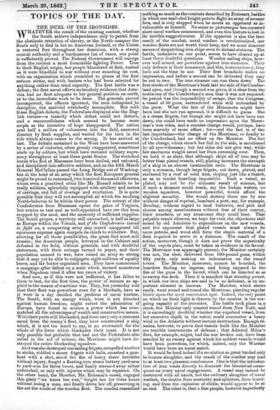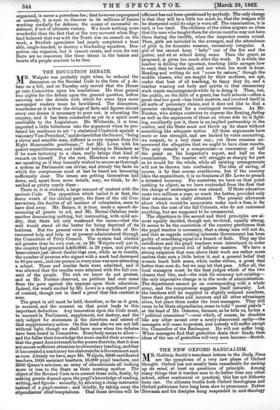TOPICS OF THE DAY.
THE DUEL OF THE IRONSIDES.
WlltTEVER the result of the existing contest, whether he South achieve independence only to perish from. the obstinate retention of slavery, or the North conquer the South only to find in her an American Ireland, or the Union is restored free throughout her dominion, with a strong central authority and a burdensome list of taxes, one point is sufficiently proved. The Federal Government will emerge from the contest a most formidable fighting Power. True to their English origin, her people blundered at first, rushed as it were blindfold to war without ever counting its cost, with an organization which crumbled to pieces at the first serious strain, and. with leaders who had been selected for anything rather than tried capacity. The first battle was a defeat ; the first naval efforts melancholy evidence that Ame- rica had no fleet adequate to her general position on earth, or to the immediate work to be done. The generals proved incompetent, the officers ignorant, the men indisposed :to discipline, the materiel wretchedly incomplete. But with these English defects, the Federalists displayed also the Eng- lish virtues—a tenacity which defeat could not disturb, and a resourcefulness which seemed to become more ample as the incentive of hope disappeared. The nation sent half a million of volunteers into the field, answered disaster by fresh supplies, and waited for the turn in the tide which always comes to the strong. It has arrived at last. The defeats sustained in the West have been answered by a series of victories, often grossly exaggerated, sometimes made up by editors, but which have restored military supre- macy throughout at least three great States. The wretched horde who fled at Manassas have been drilled, and rationed, and disciplined into effective soldiers, and on the 10th March General McClellan passed the Long Bridge out of Washing- ton at the head of an army which the first European general might be proud to command, two hundred thousand effectives, whom even a practised critic like Mr. Russell admits to be really soldiers, splendidly equipped with artillery and means of carriage, and full of courage and exultation. It is quite possible that they will not accomplish all which the exulting Northebelieves to be within their power. The retreat of the Confederates from Manassas opens the gates of Virginia, but armies as vast and as well-appointed have ere this been stopped by the mud, and the necessity of sufficient supplies. The South proper, a territory still untouched, is half as large as Europe within the Vistula, and if the Confederates intend to fight on, a conquering army may march unopposed till enormous expense again compels its chiefs to withdraw. But, allowing for all those possibilities, the great fact must still remain; the American people, betrayed in the Cabinet and defeated in the field, without generals, and with doubtful statesmen, with their coinage turned to paper, and their population unused to war, have raised an army so strong that it may yet he able to subjugate eight millions of equally brave, and far better organized men. They have commenced a campaign after defeat on a scale which seemed monstrous when Napoleon tried it after ten years of victory. And now, as if this were not sufficient, it has fallen to them to test, for the first time, the power of science as ap- plied to the means of maritime war. They, but yesterday told that their fleet was powerless even for a blockade, have as it were in a day decided the problem of naval warfare. The South, with an energy which, were it not directed against human freedom, might extort the admiration of Europe, have found in science a power which has over- matched all the advantages of wealth and constructive means. With their ports still blockaded, and their navy only a remnant saved from the enemy's fleet, they have constructed a ship which, it is not too much to say, is an overmatch for the whole of the force which blockades their coast. It is not only possible but probable that had not the Federalists also called in the aid of science, the Merrimac might have de- stroyed the entire blockading squadron. As itwas she destroyed one sailing frigate, compelled another to strike, riddled a steam frigate with balls, smashed a gun- boat with a shot, stood the fire of heavy shore batteries without injury, fought a floating iron steam battery yard-arm to yard-arm for three hours, and finally steamed away either untouched, or only with injuries which may be repaired. On the other hand, the Monitor, Mr. Ericsaon's vessel, engaged this giant "six times her size," fought her for three hours without losing a man, and finally drove her off, preserving in the act the whole of the wooden fleet. The combat resembled nothing so much as the contests described by Froissart, battles in which one mail-clad knight puts to flight an army of meaner foes, and is only stopped when he meets an opponent as in- vulnerable as himself. No scene so picturesque has occurred since naval warfare commenced, and eventhis feature is lost in its terrible suggestiveness. If the apparent is also the true result of the combat, naval warfare is revolutionized, our wooden fleets are not worth their keep, and we must discover means of deepatching iron ships even to distant stations. The battle, indecisive on one point, seems to have cleared up at least three doubtful questions. Wooden sailing ships, how- ever well armed, are powerless against iron steamers. Their only defence is their armament, and this, however heavy, they have not the time to use. Their first broadside makes no impression, and before a second can be delivered they may be cut in two. The iron steamer can run them down. The first stroke of the Merriinac's beak laid the side of the Cumber- land open, and though a second was given, it is clear from the testimony of the Cumberland's men that it was not required. So patent was the impossibility of escape, that the Congress, a vessel of 50 guns, surrendered while still untouched by the prow. What the fate of the Minnesota might have been had she not run aground, it is difficult to guess. She is a steam frigate, but though she might not have been run down, she could have made uo impression upon the Merri- mac's iron sides, and a counter-charge would, perhaps, have been scarcely of more effect ; for—and the fact is of the last importance—the charge of the Merrimac, so deadly to the Cumberland, had no effect on the Monitor. The fact of the charge, which struck her full in the side, is mentioned by all eye-witnesses ; but her sides did not give way, while her enormous weight saved her from careening over. Then, we hold it as clear, that although ships all of iron may be better than plated vessels, still, plating increases the strength of a ship in an almost inestimable ratio. The Merrimac is only a common, though large frigate, cut down, plated, and sheltered by a roof of solid iron, sloping just like a thatch, so as to render boarding impossible. Such a vessel, so plated, may not be the ultimate result of science, but if such a steamer could reach, any the Indian waters, no wooden squadron, however powerful, would afford the slightest security. She would destroy them one by one without danger of reprisal, bombard a port, say, for example, Bombay, without regard to land batteries, and pick and choose among merchantmea without fear of their convoy, their numbers, or any armament they could bear. That palpable result silences, we hope for ever, the objections still raised by old Admirals to expenditure on the new vessels, and the argument that plated vessels must always be mere patrols, and wood still form the staple material of a fleet required to serve at a distance. The result of the action, moreover, though it does not prove the superiority of the cupola plan, must be taken as evidence in its favour. The Merrimac was apparently pierced, the Monitor certainly was not, the shot, delivered from 100-pound guns, within fifty yards, only making an indentation on the round tower. The Monitor, moreover, cannot be boarded, the boarders finding no ingress, and being exposed to the fire of the guns in the turret, which can be directed so as to sweep the deck. Then it is manifest that steering power, in which our iron ships are said to be so deficient, is an im- portant element in success. The Monitor, which steers easily, went round and round the Merrimac, planting regular blows upon the most convenient spot. Indeed, the only point on which no fresh light is thrown by the combat is the sea- going capacity of the ironsides. The battle took place in a creek, the Monitor only coasted round from New York, and it is exceedingly doubtful whether the cupolaed vessel, from her excessive depth in the water, could encounter a heavy wind in the Atlantic without instant destruction. Enough re- mains, however, to prove that vessels built like the Monitor are terrible instruments of defence ; that Admiral Milne's fleet, for example, might, had the war broken out, have been assailed by an enemy against which his noblest vessels would have been powerless, for which, indeed, only the Warrior would have been an equal match. It would be hard indeed if a revolution so great tended only to human slaughter, and the result of the combat may lead to at least two pleasant conclusions. One is that the introduc- tion of iron tends directly to diminish the bloodshed conse- quent on every naval engagement. A vessel may indeed be destroyed with all hands, but the ordinary slaughter of naval warfare, the deaths from musketry and splinters, from board- ing, and from the explosion of shells, would appear to be at an end. The other is, that a free people, however imperfectly organized, is never a powerless foe ; that however unprepared or unready, it is sure to discover in its millions of brains working cordially for defence, the means of successful re- sistance, if not of ultimate victory. We know nothing more wonderful than the fact that at the very moment when Eng- land believed that war with the North was an assault on the weak, a Swedish speculator had nearly completed a boat able, single-handed, to destroy a blockading squadron. Des- potism can organize, but it cannot create, and even for war there are no resources like those latent in the brains and hearts of a people resolute to be free.































 Previous page
Previous page